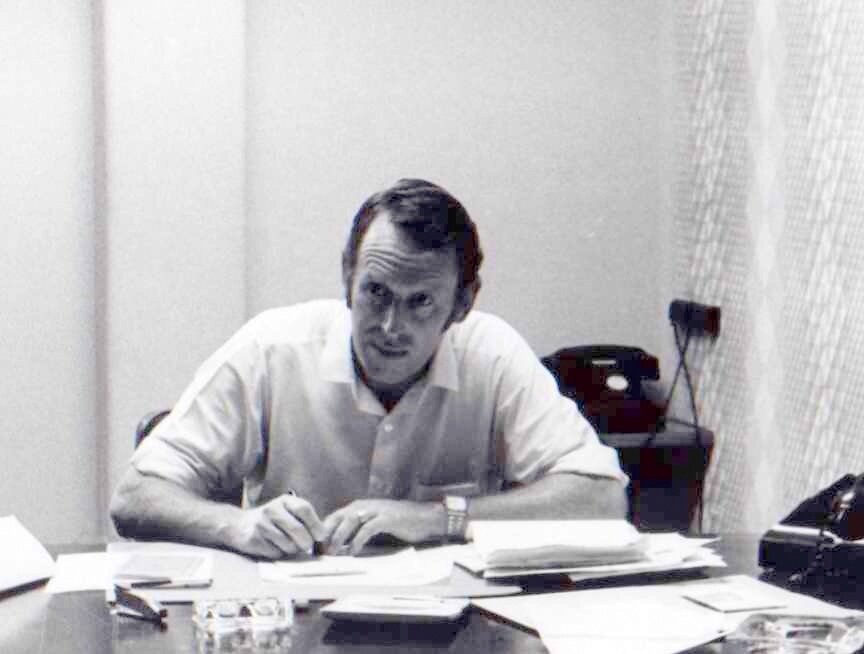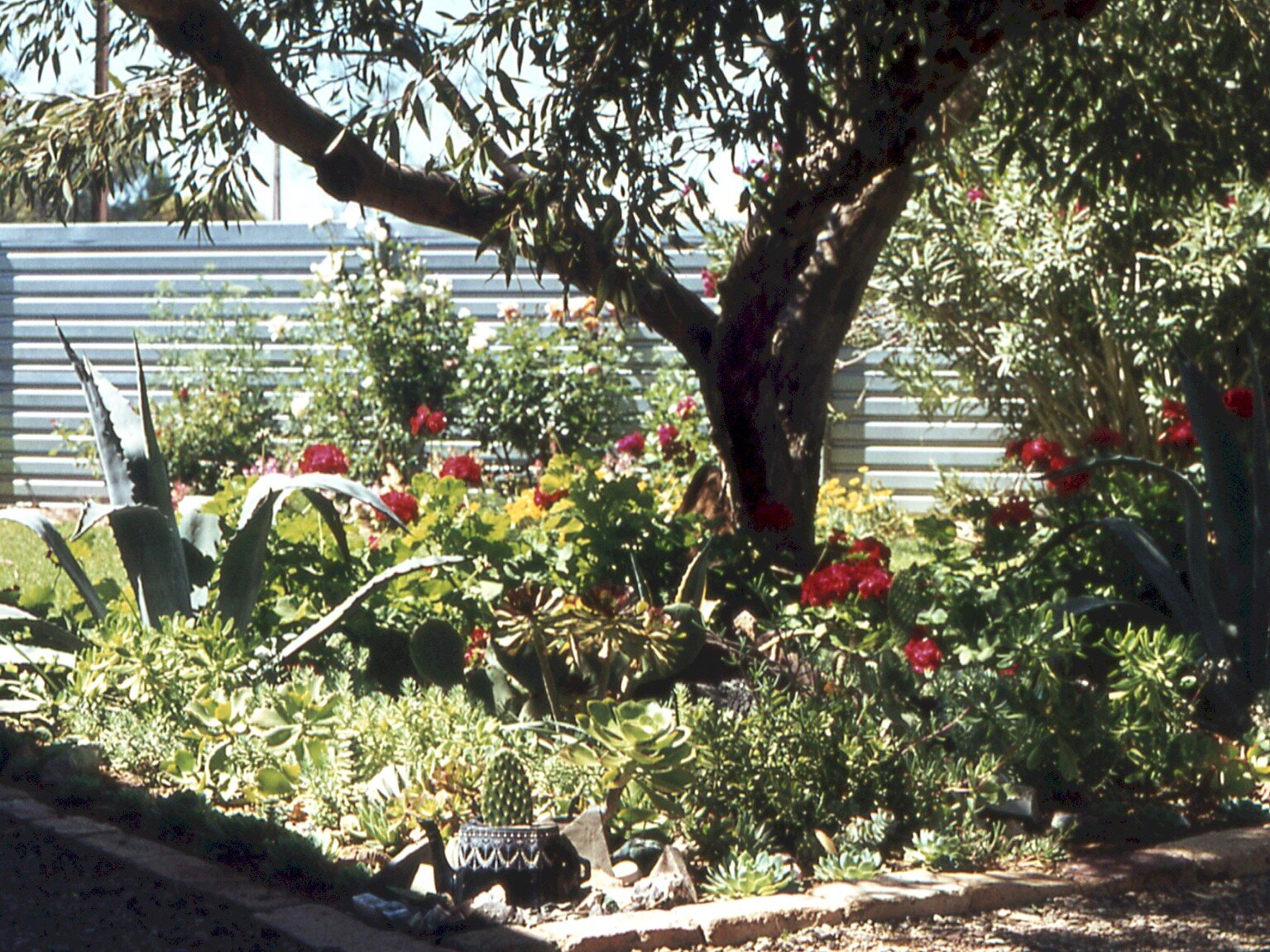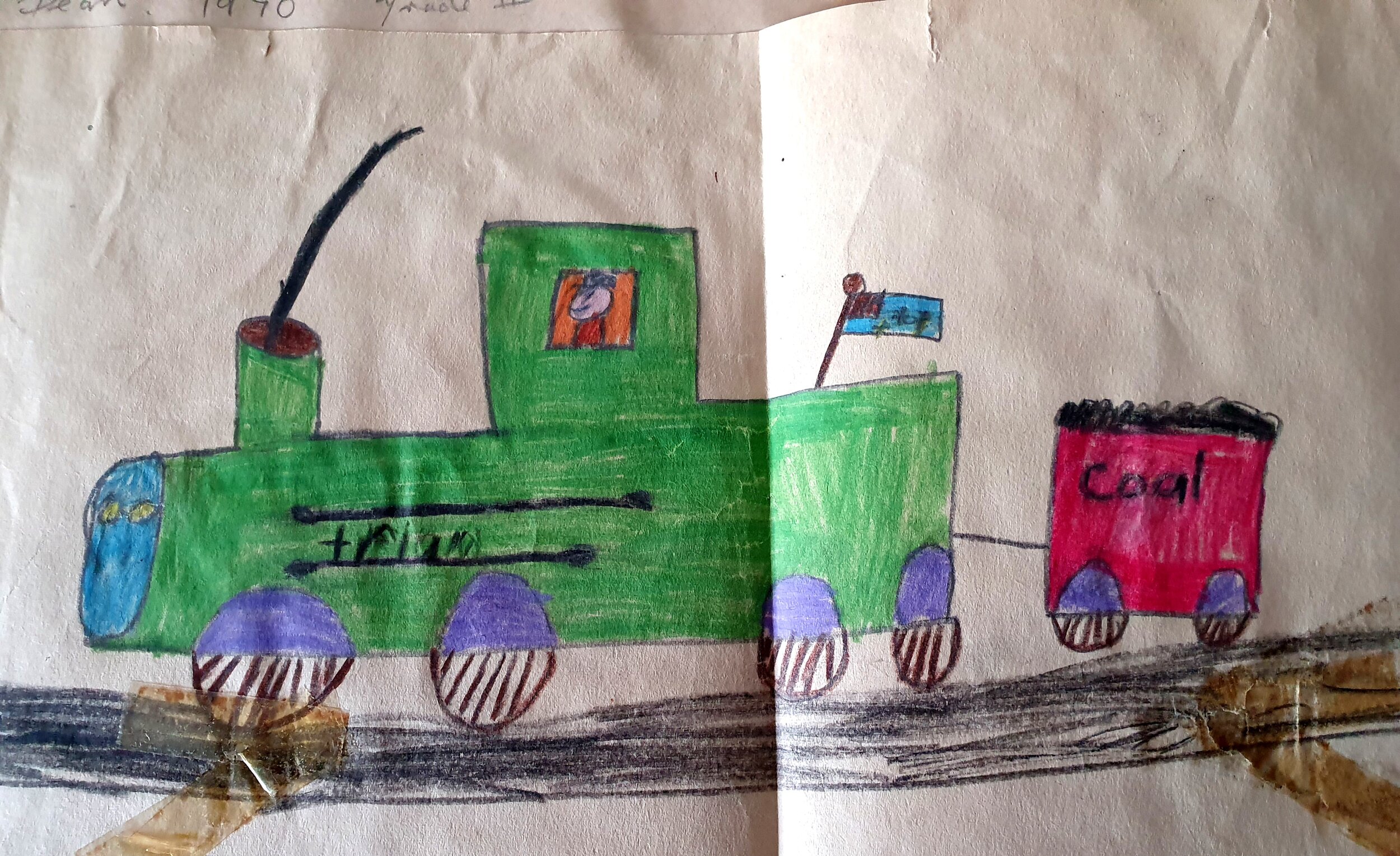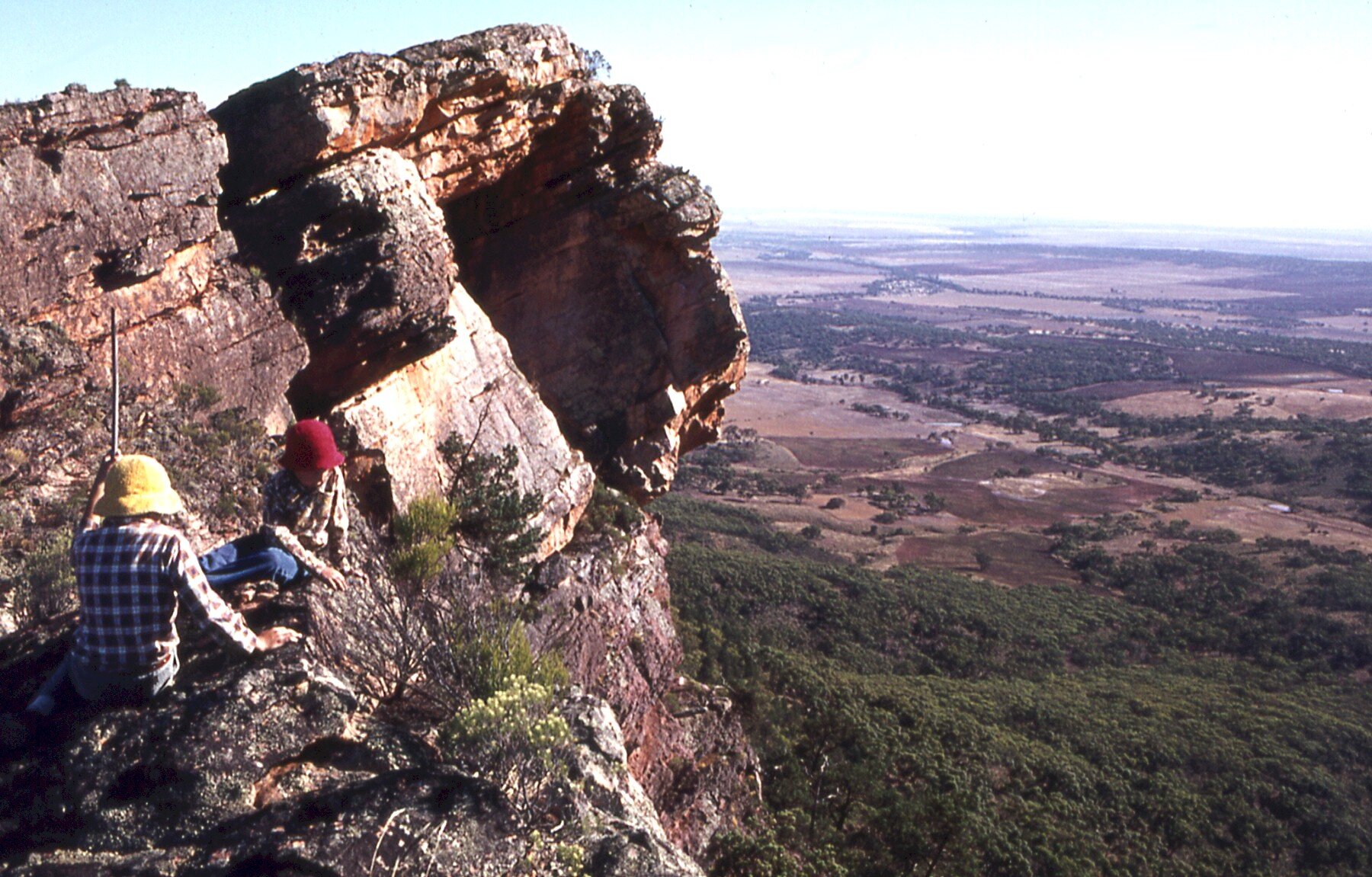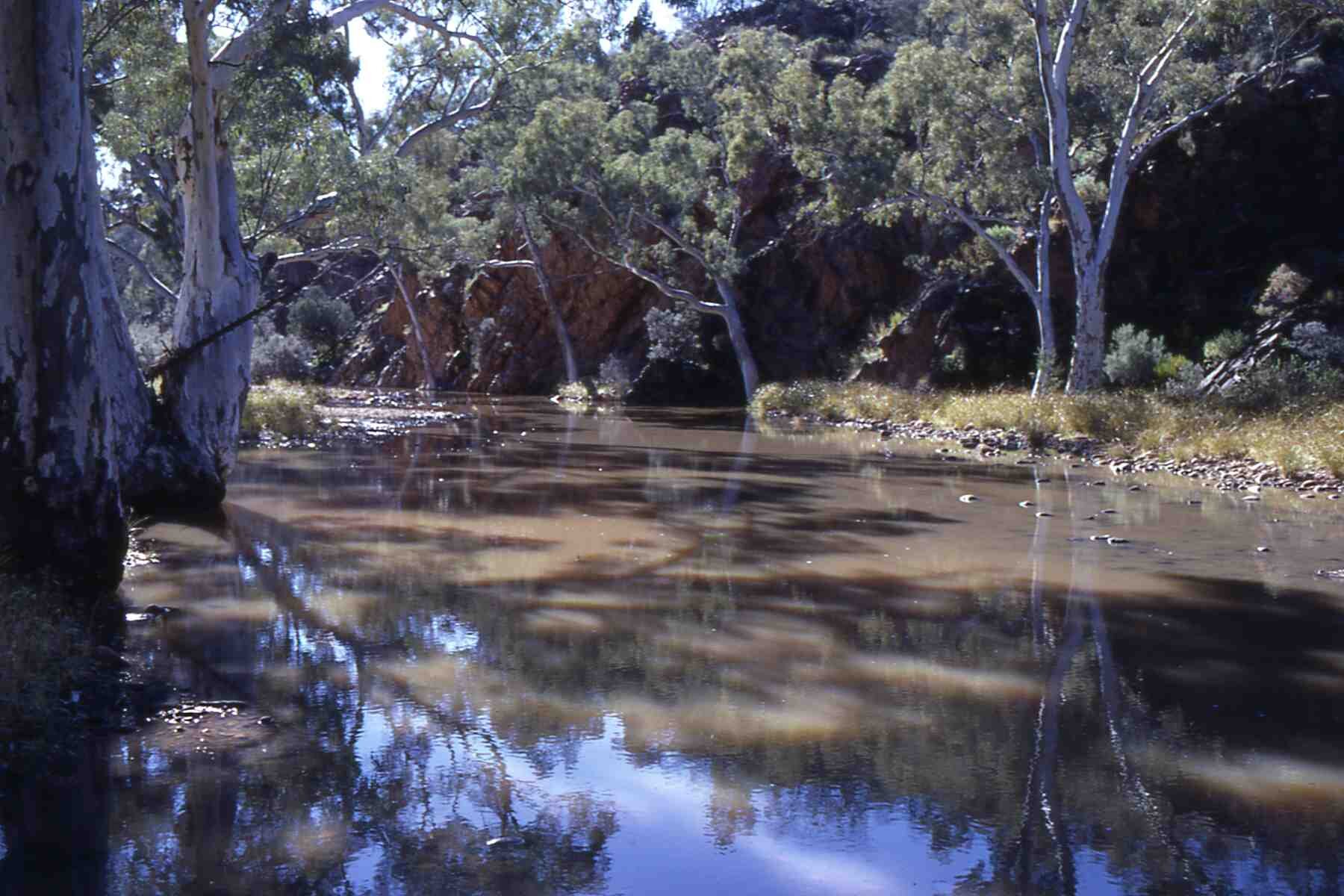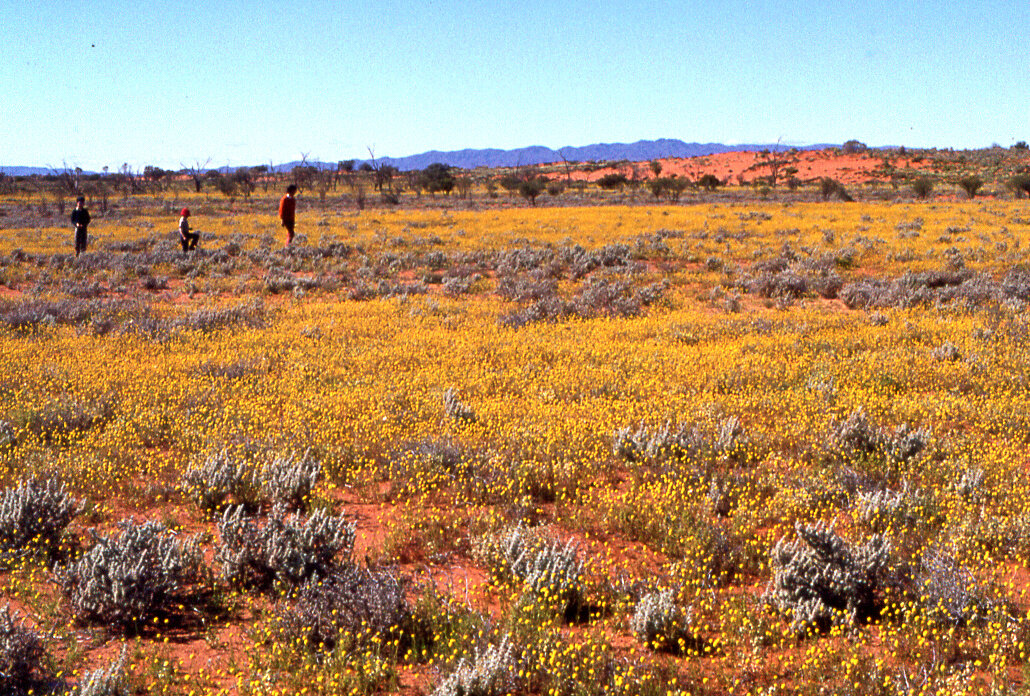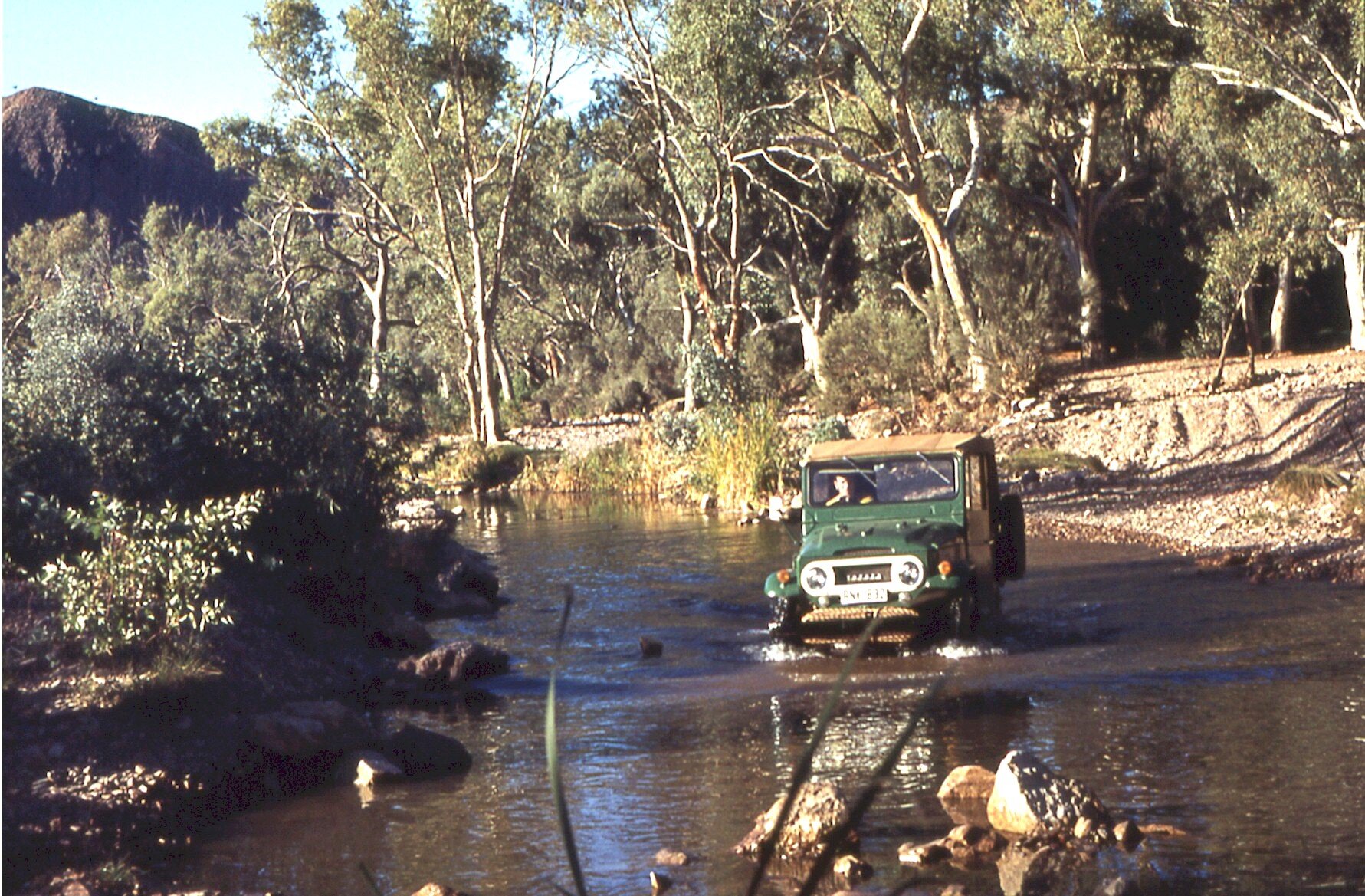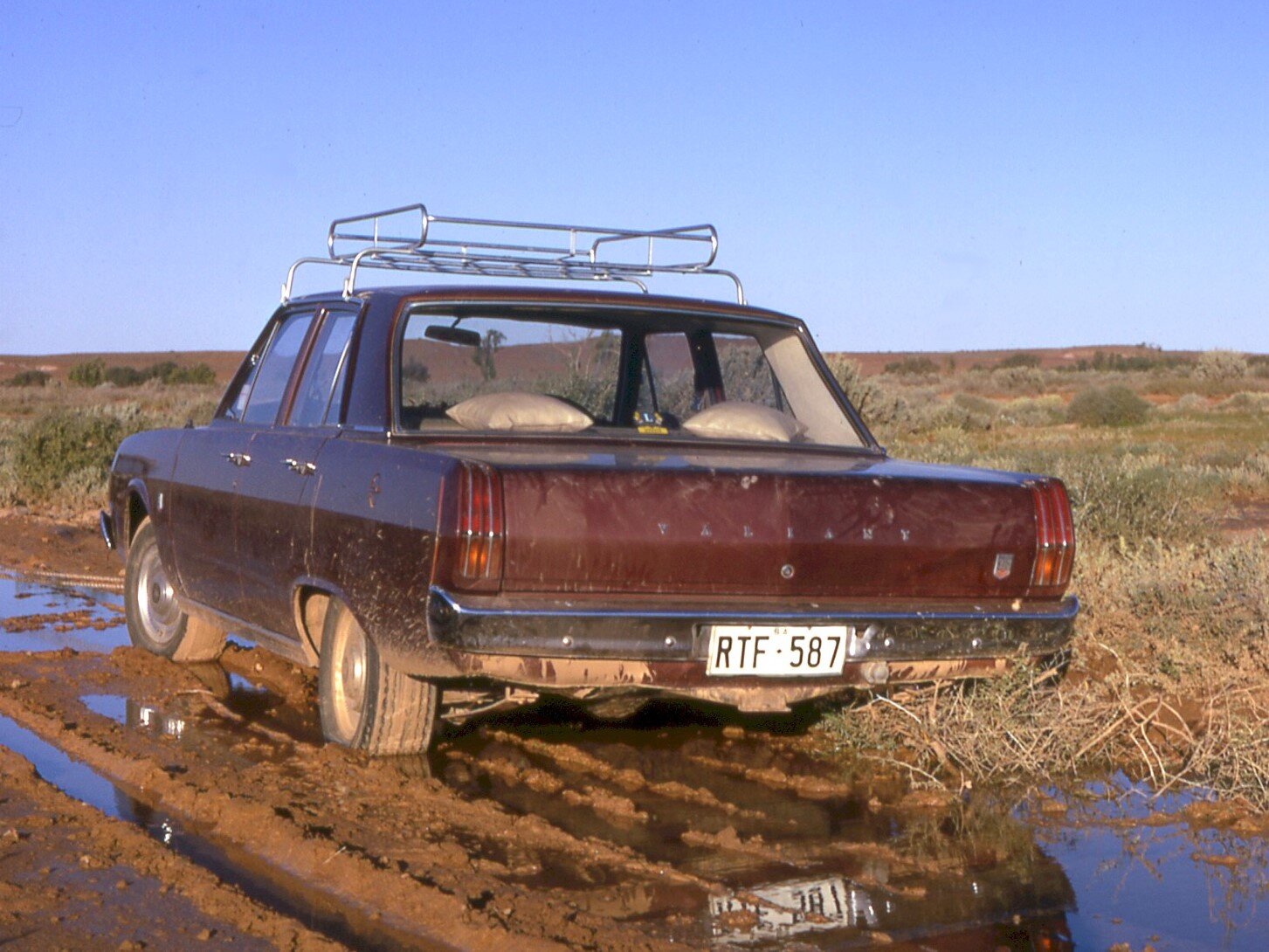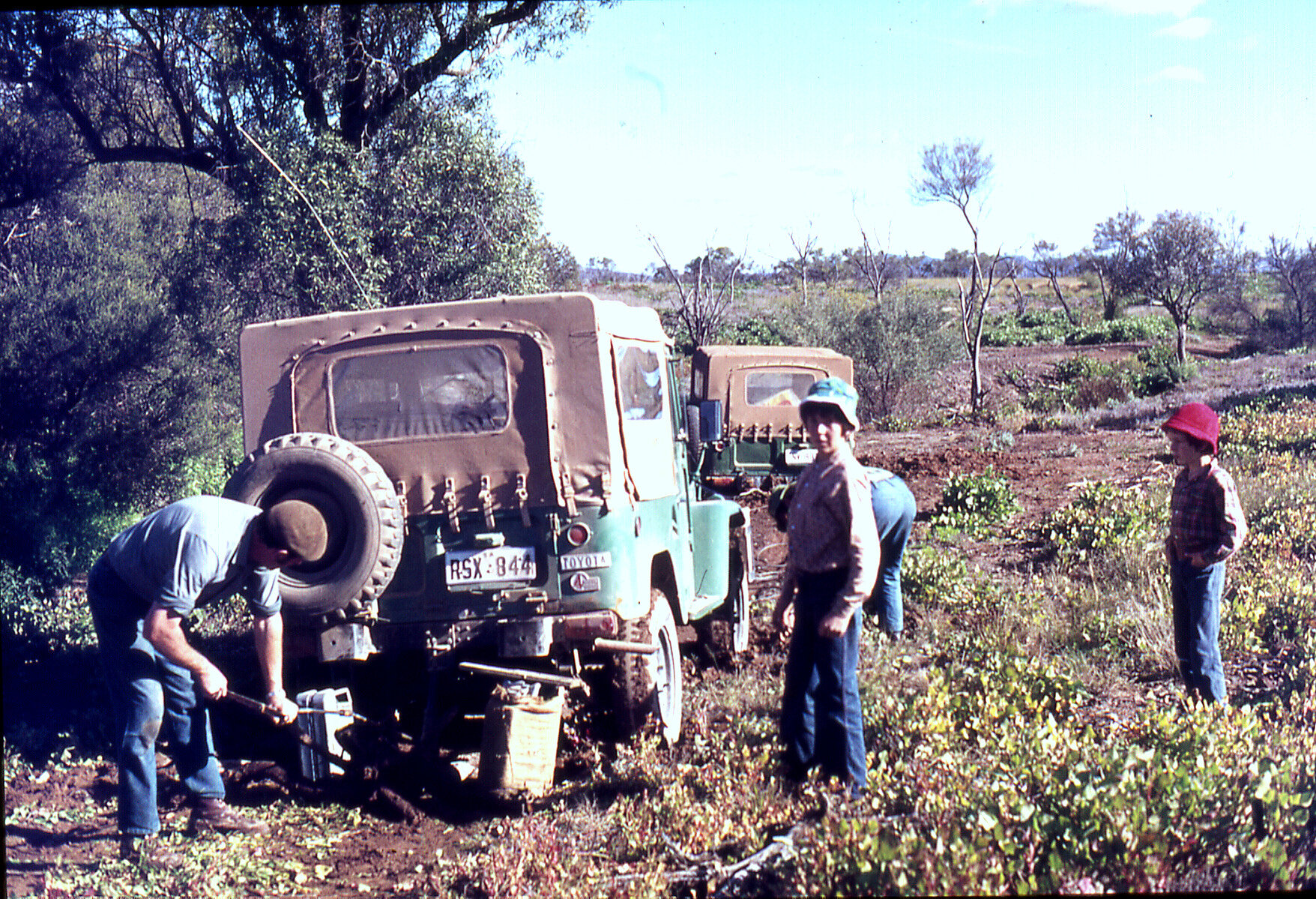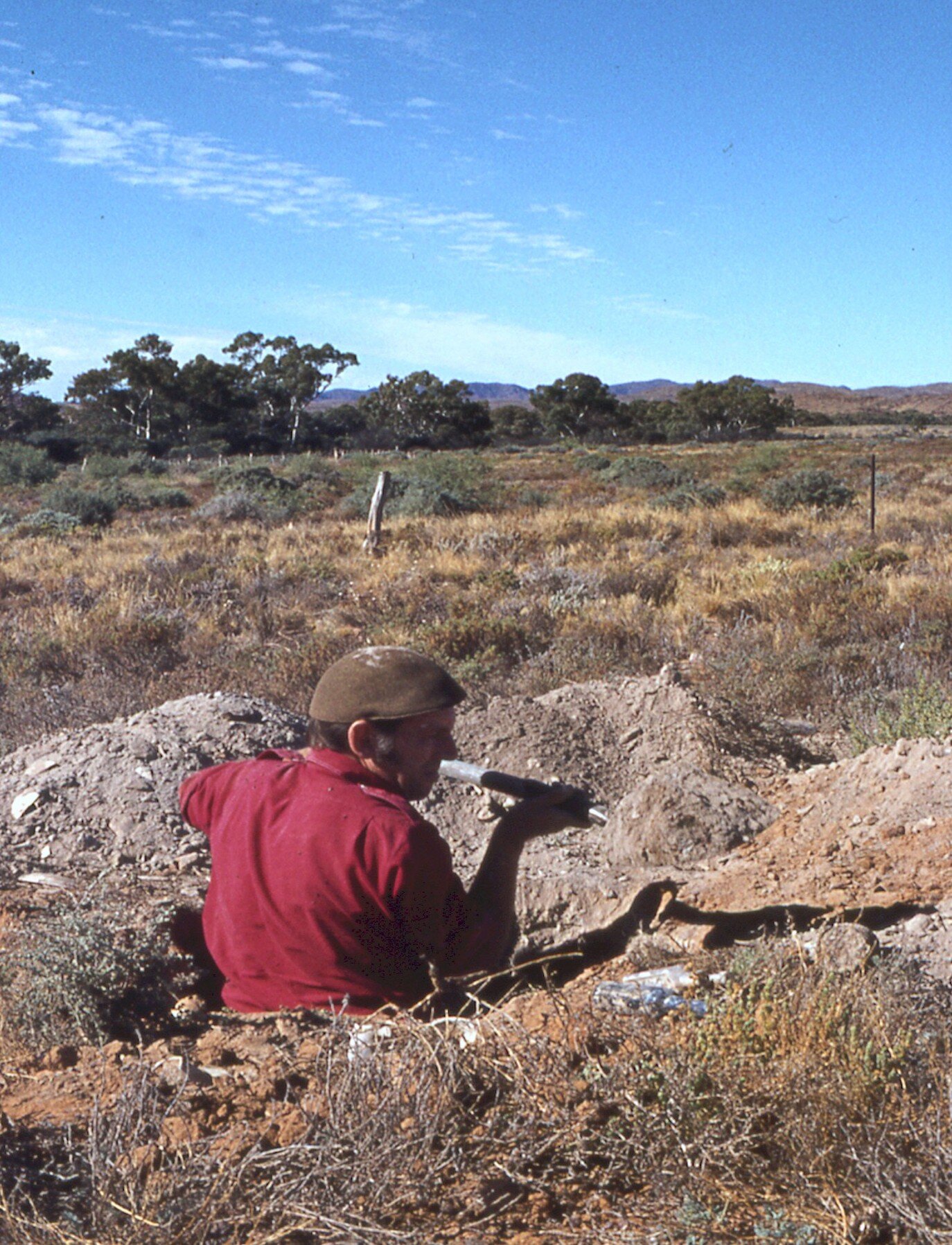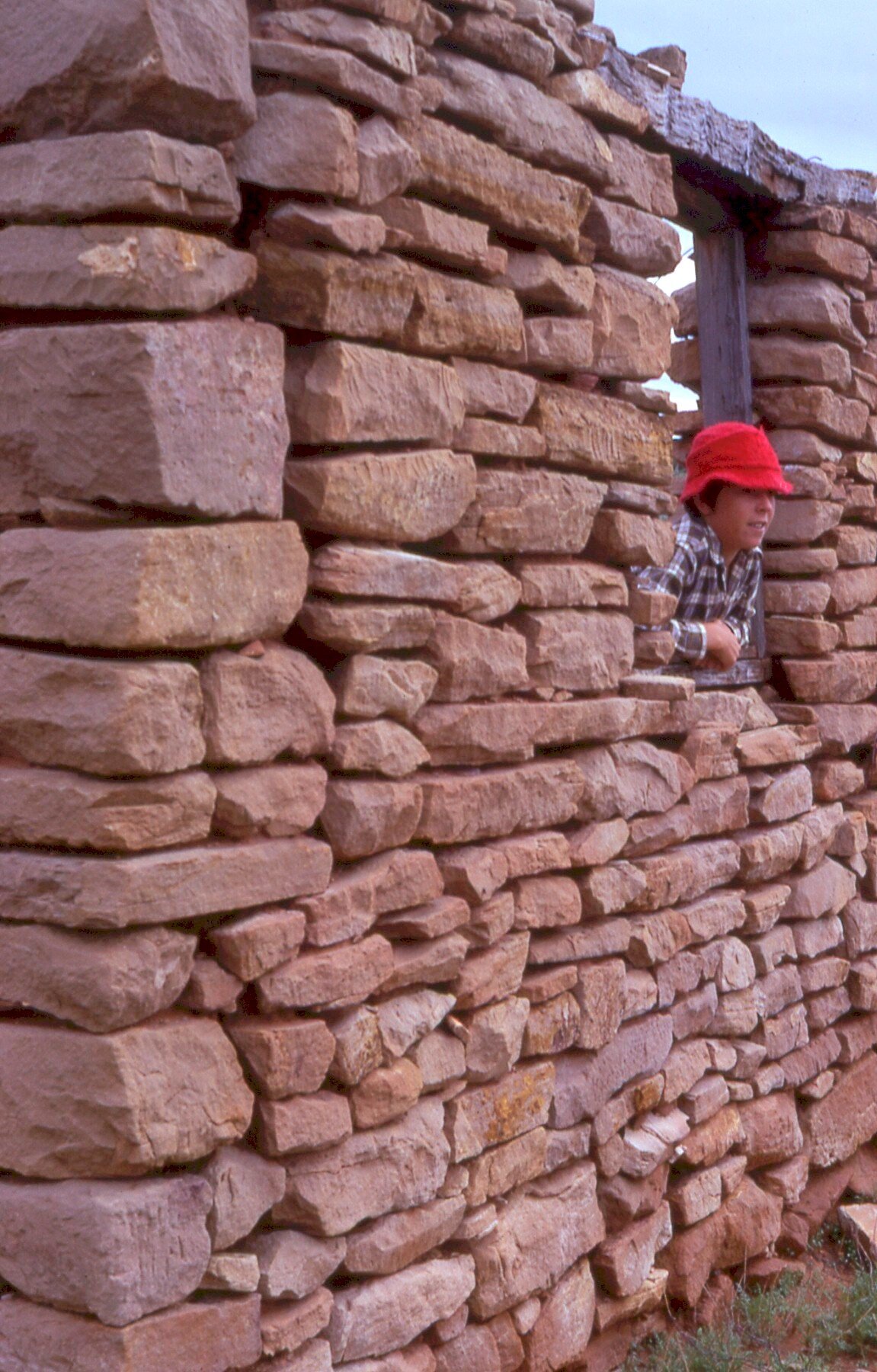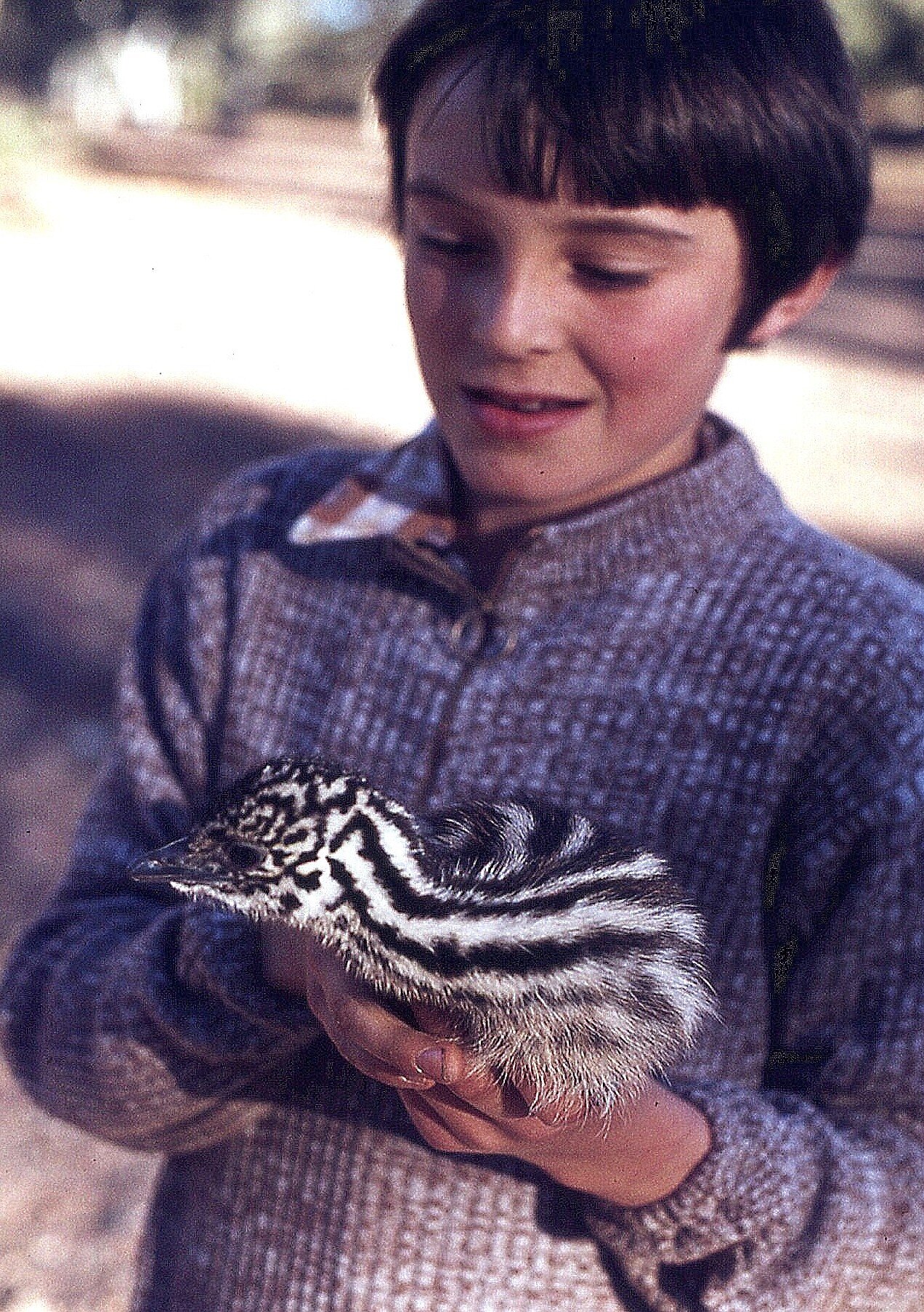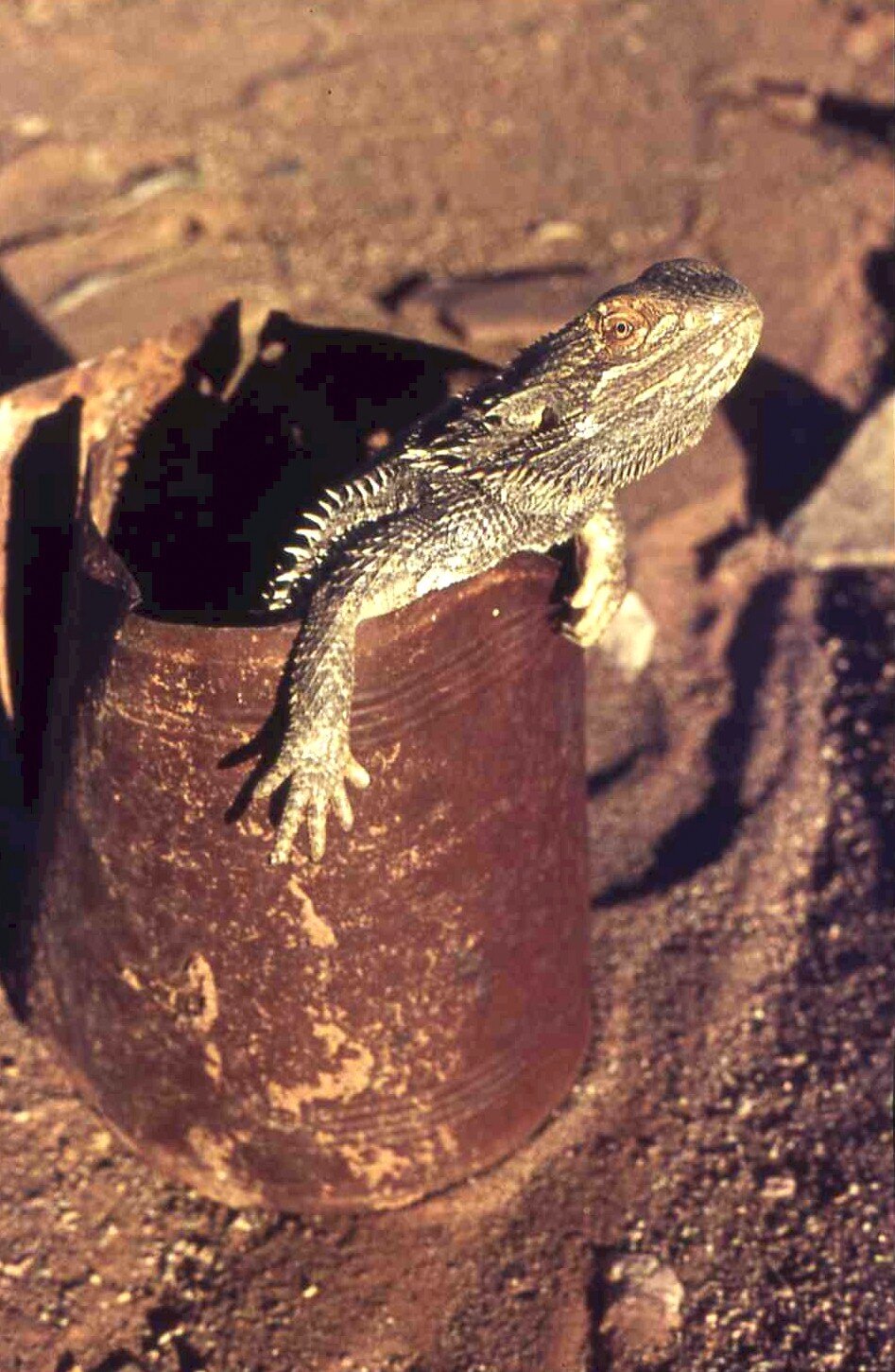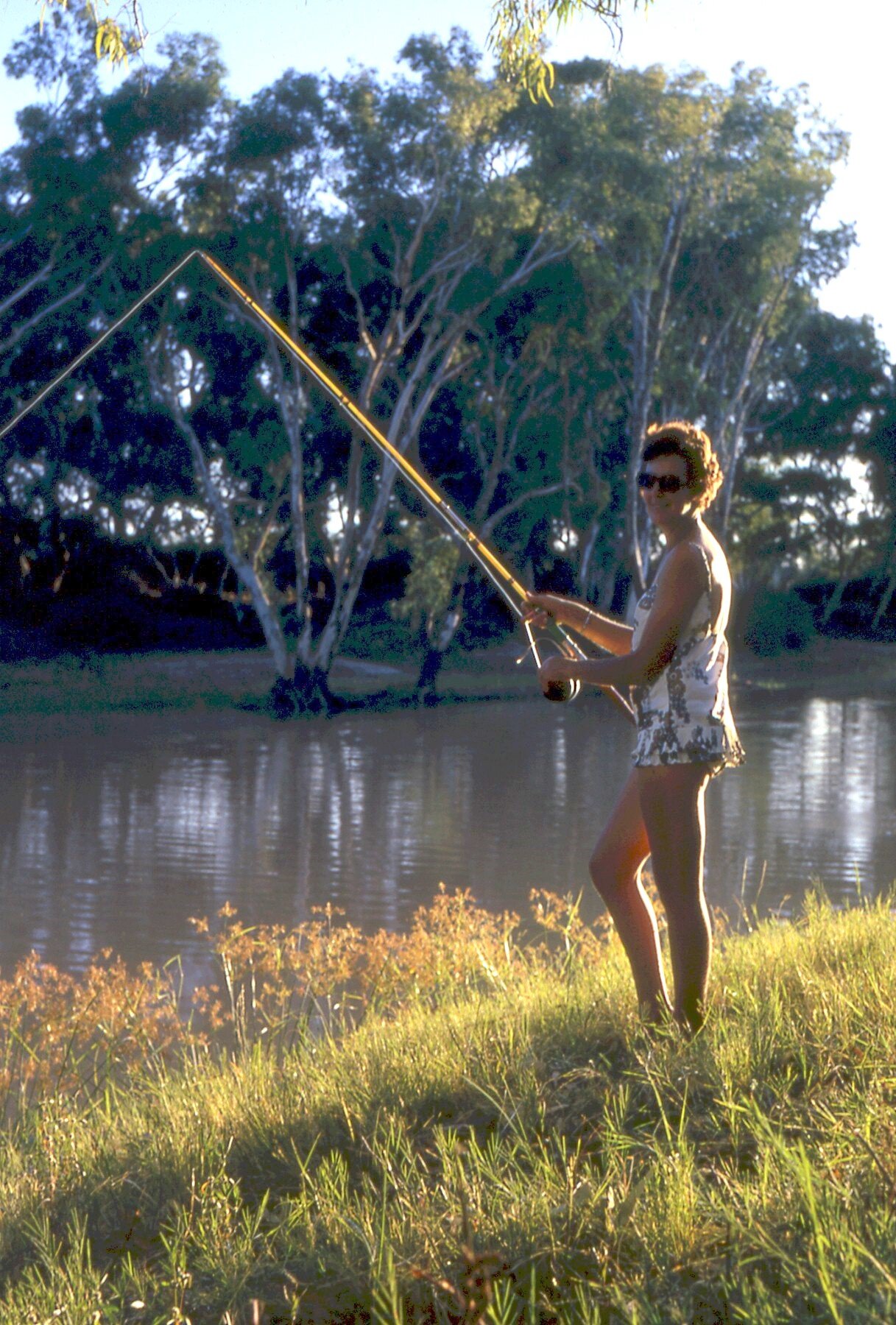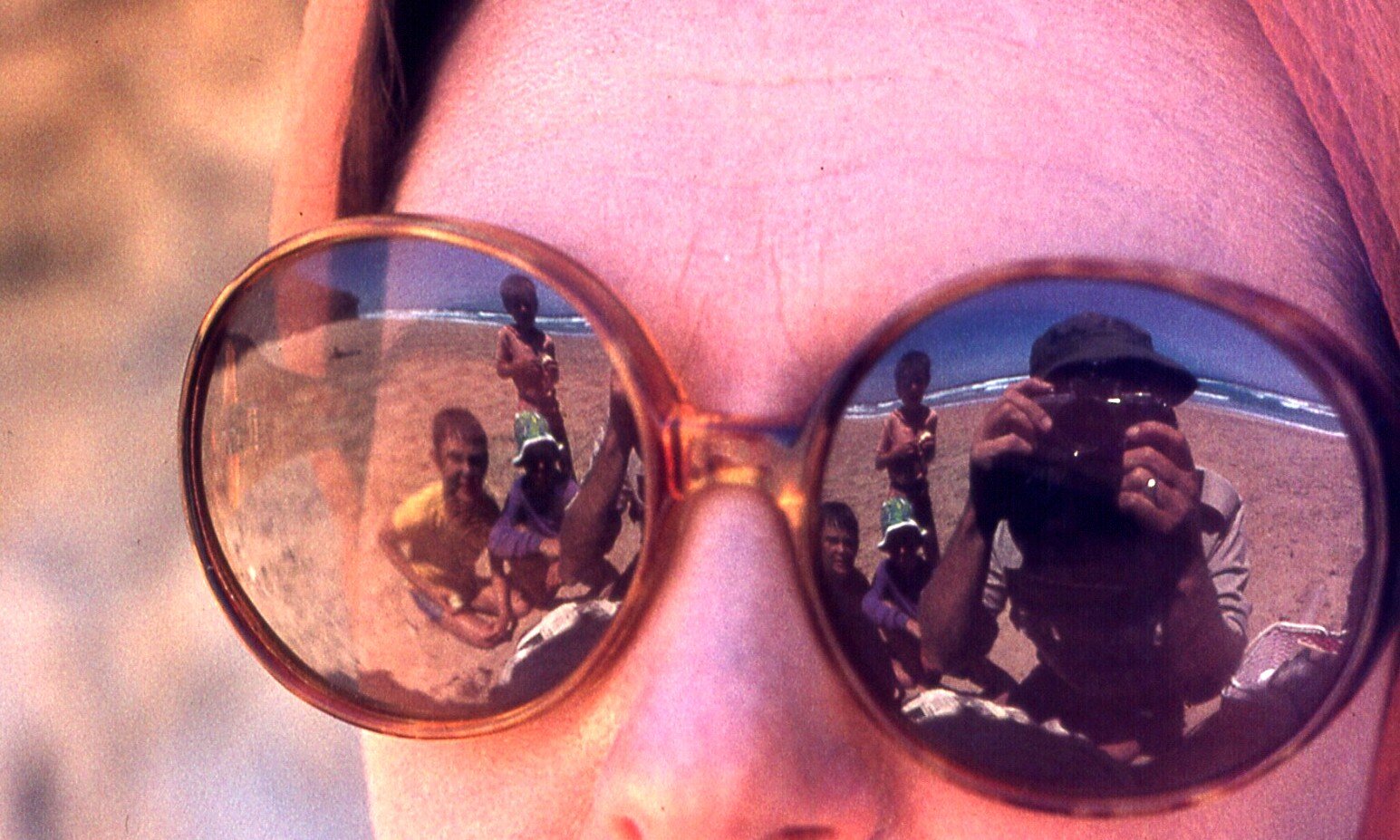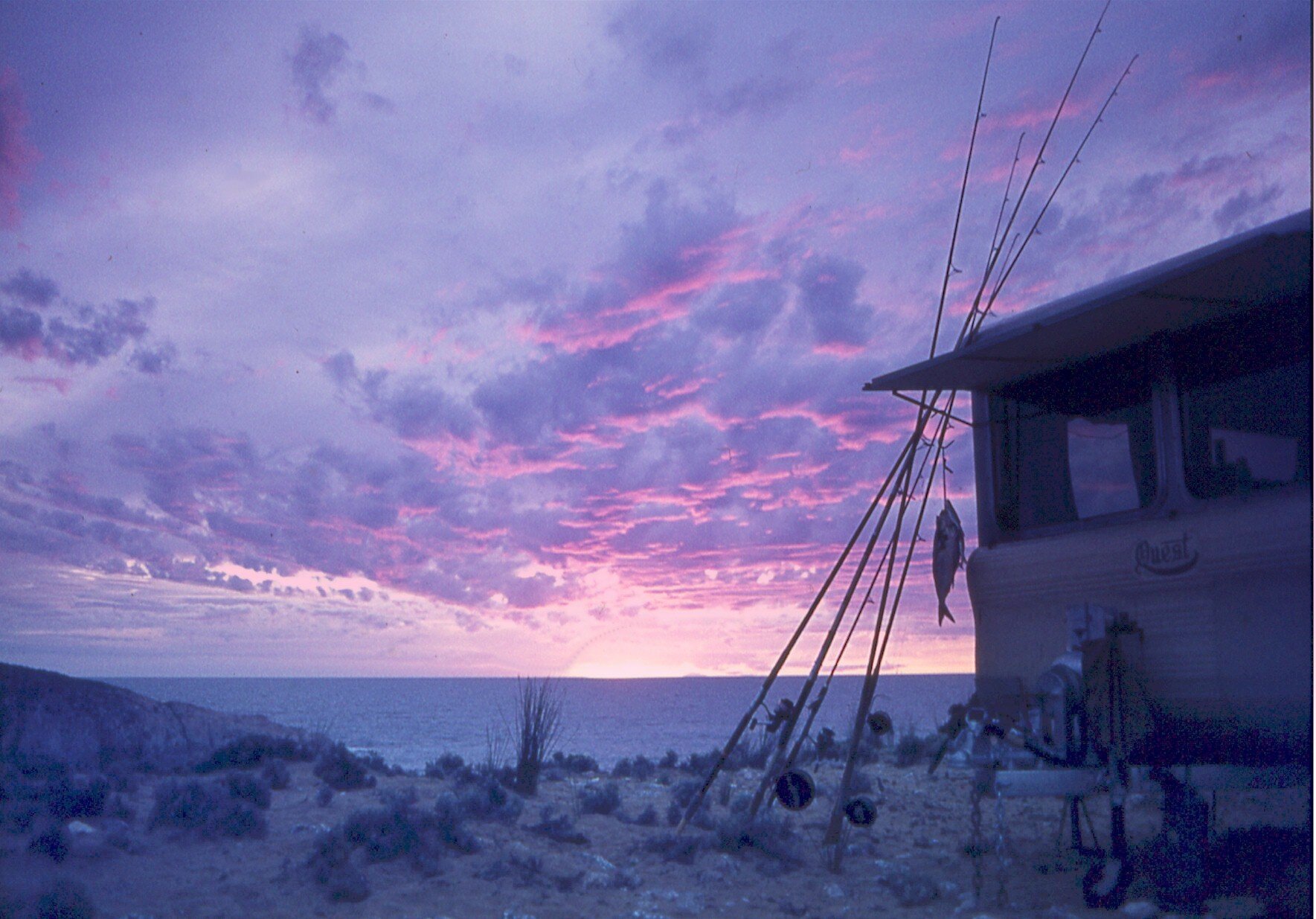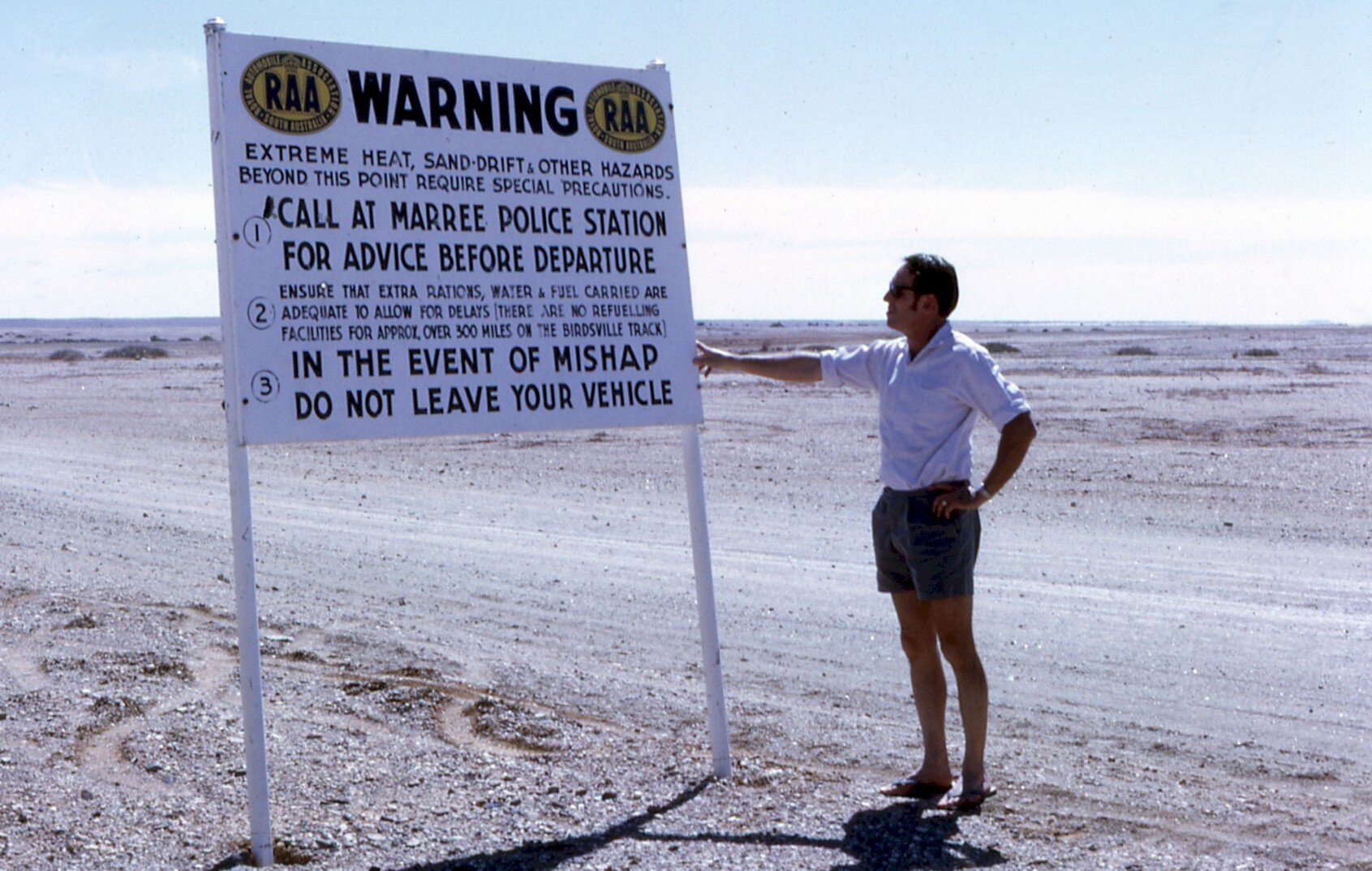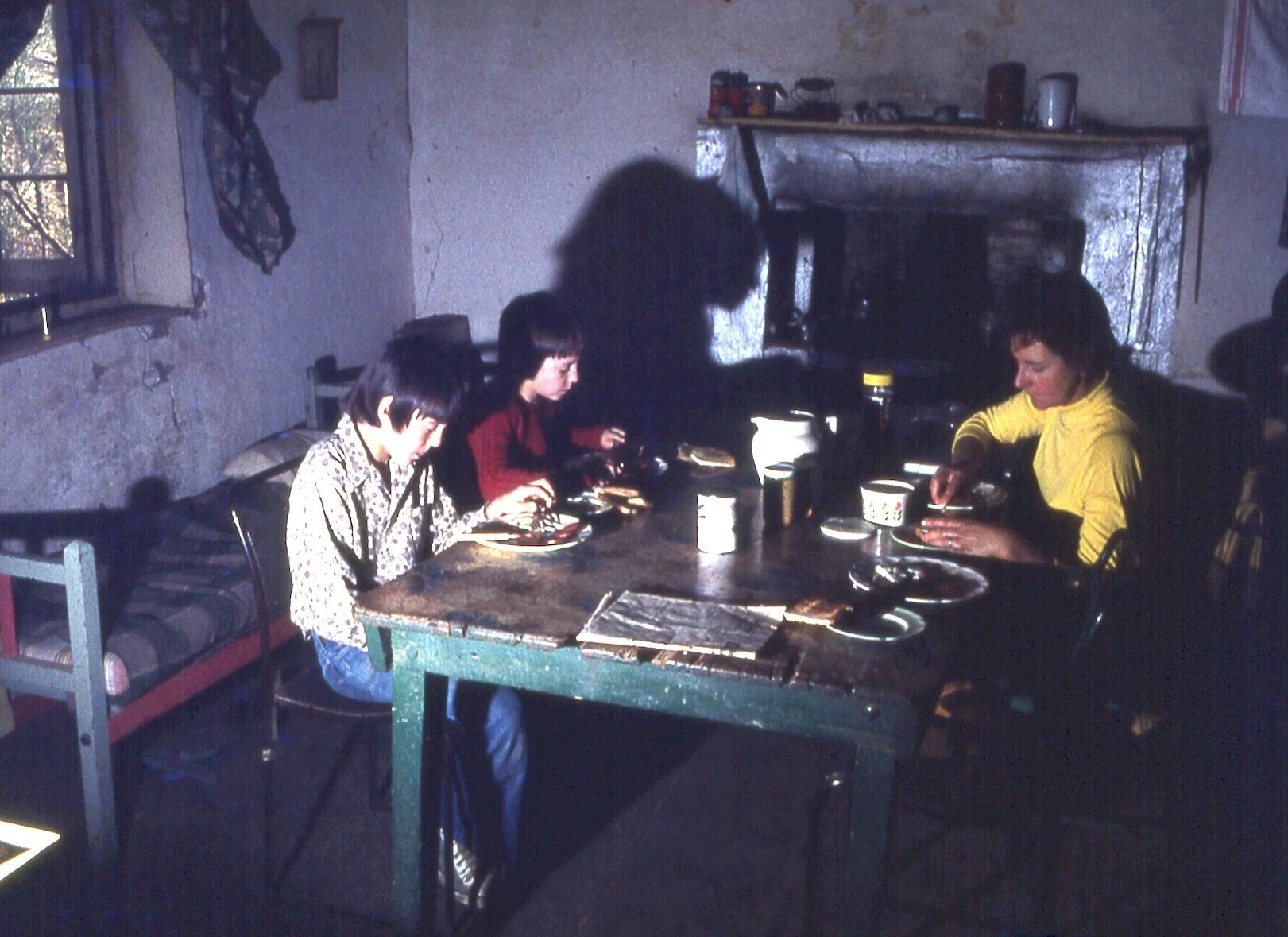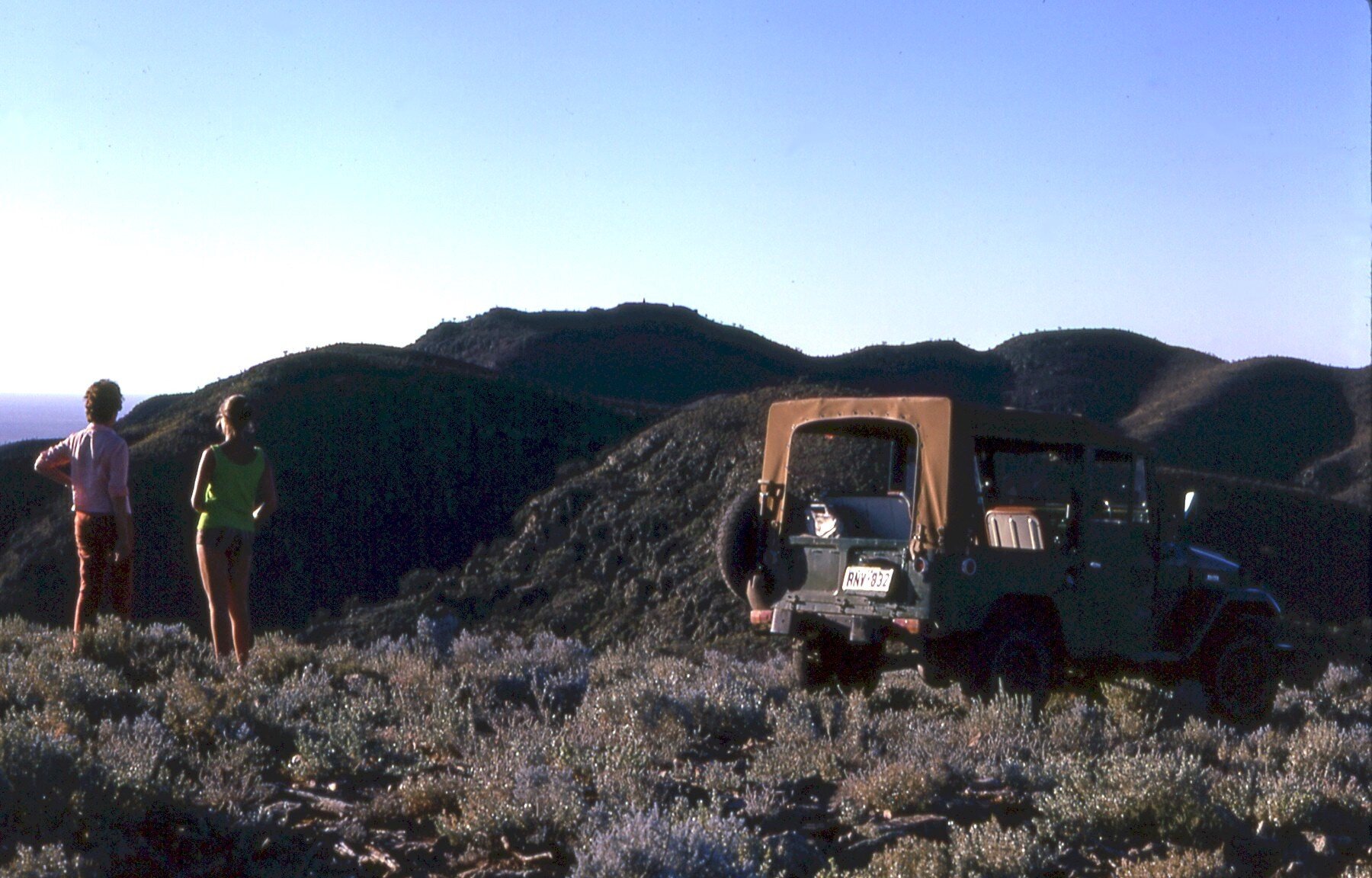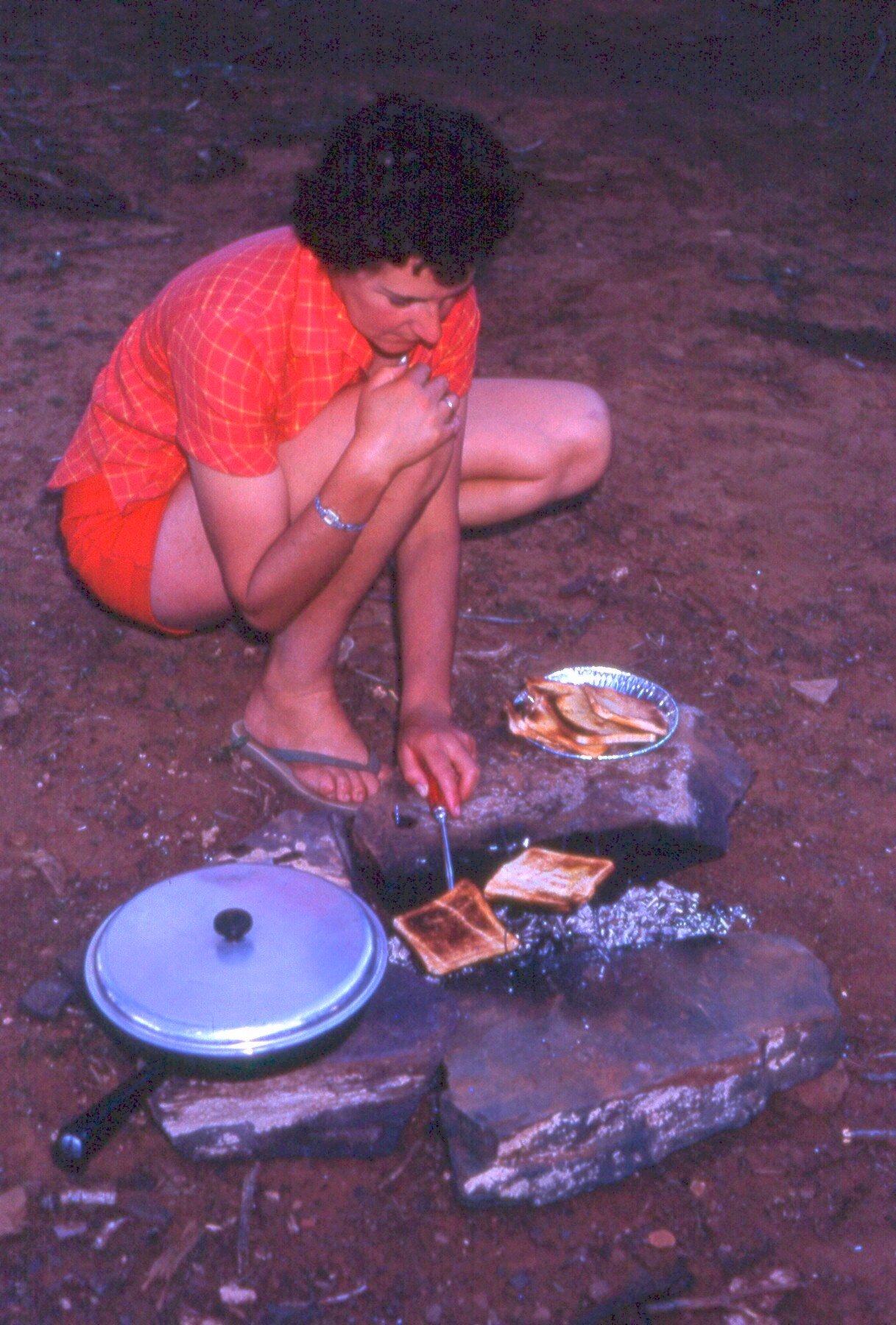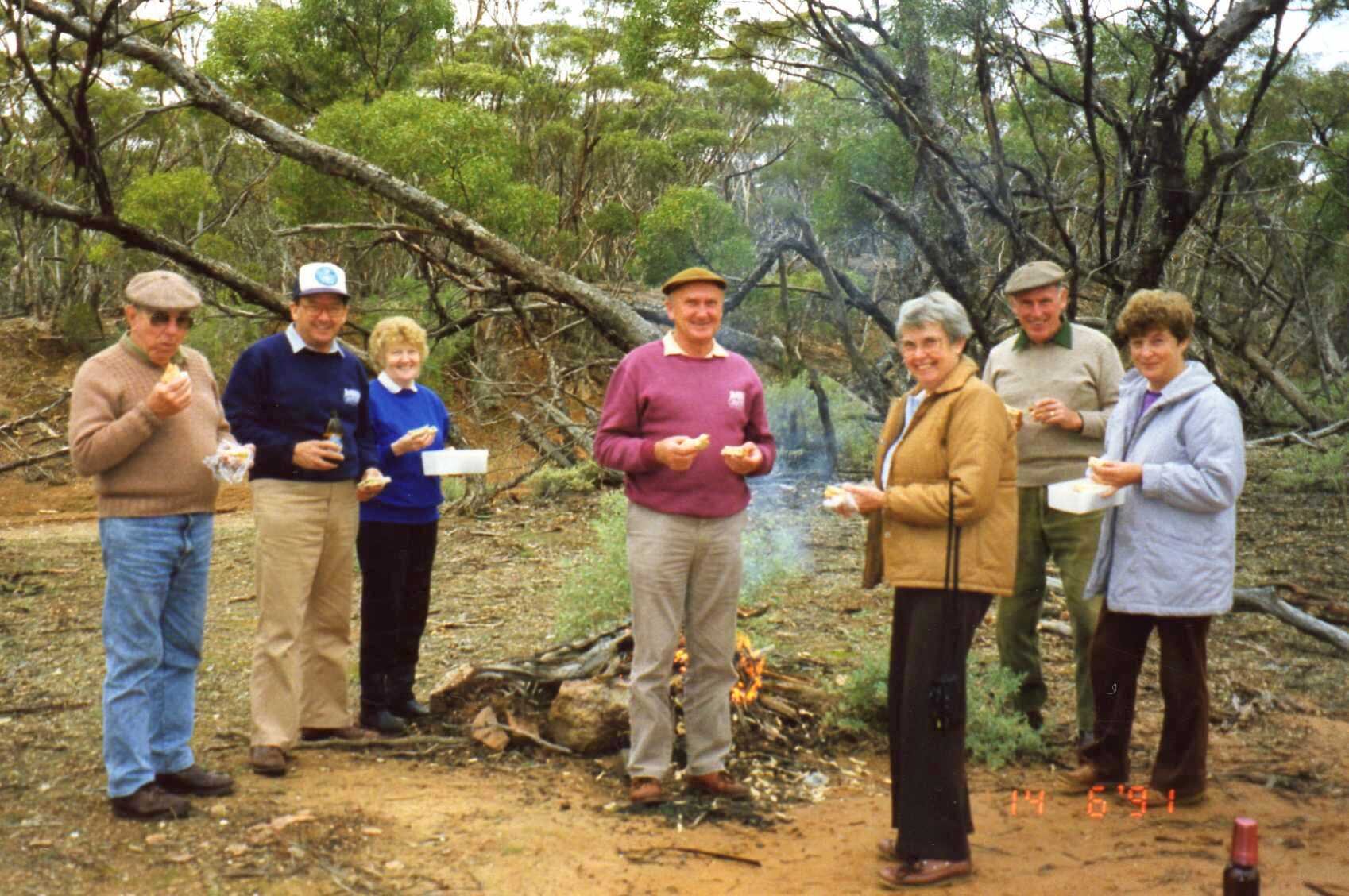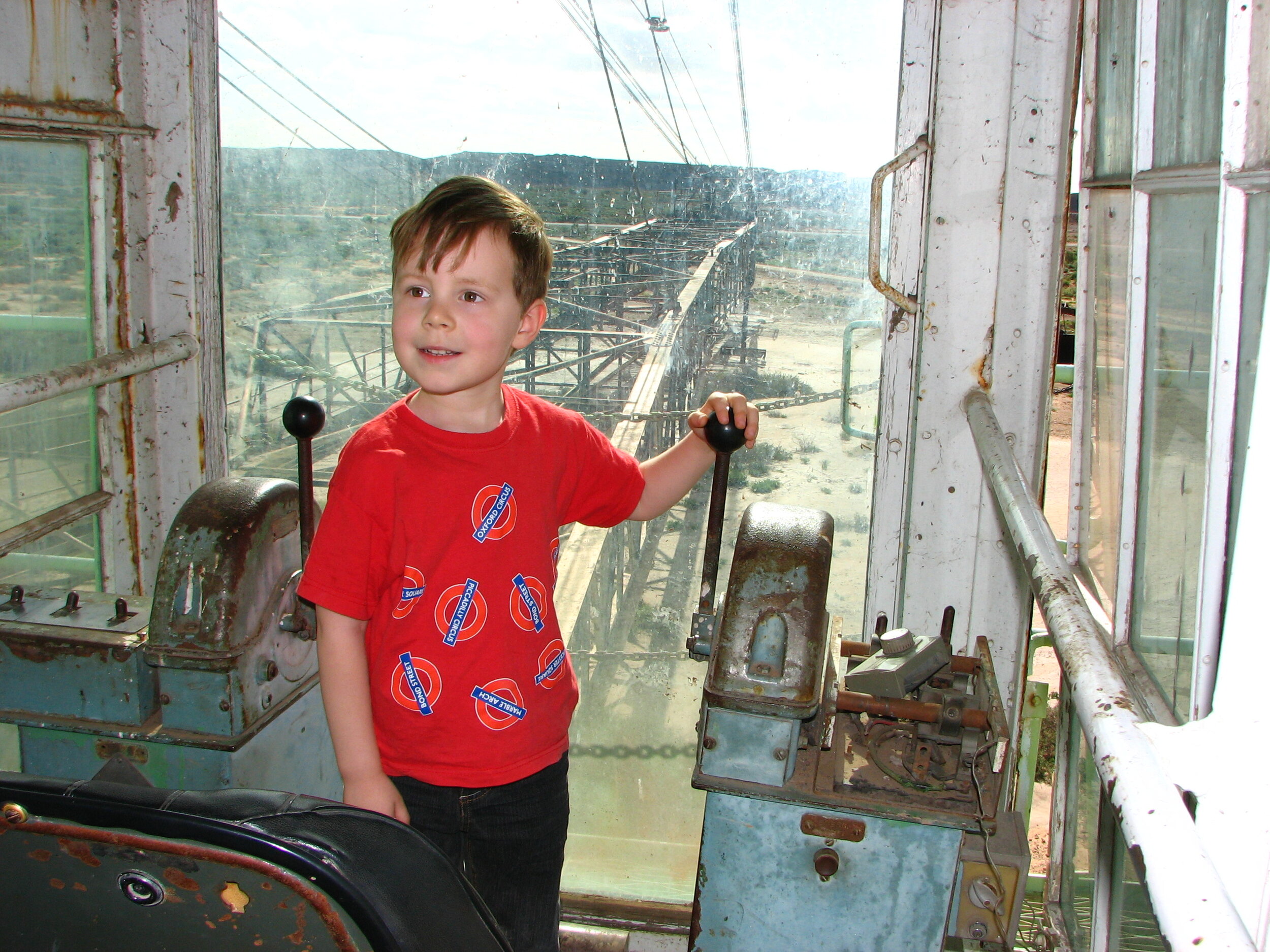The Ransom Family (1969 - 1975)
My name is Dean Ransom. I was born in 1963 and lived in Leigh Creek “Old Town” from 1969 to 1975 with my father Neil, mother Dawn and brothers Adrian and Ian. Between the ages of six and twelve, and through most of my Primary School, were perhaps my most formative years as a child. Even today, when people ask me where I am from, I proudly respond “I grew up in Leigh Creek”. It was a childhood full of excitement and these are my recollections of some of the many experiences we had growing up in such a special place.
My Dad first visited Leigh Creek in August 1950 on a Pioneer bus tour from Blinman. He was 18 years old and was hiking in the Flinders Ranges. In 1952 he returned on his motor bike, a Matchless 500cc twin, and his dairy records “I decided to ride up to Copley for Easter. I packed my swag in a sausage bag across my knees and off I went. By Saturday night I was in the Copley Hotel so Sunday, I looked at the map and decided I might as well go the 70 miles up to Marree. No-one told me that the track past Lyndhurst was just a two wheel track across the desert”. A year later he joined ETSA as a Linesman’s Assistant and worked in Waikerie, Barmera, Adelaide and Mt Barker until in 1969 he saw a job application for the position of “Administrative Officer Leigh Creek”.
When we arrived in Leigh Creek we lived in our caravan for the first few weeks while our house at 8 Second Ave was being renovated and cleaned. The house was standard issue ETSA asbestos and it’s standout feature was a huge drum evaporative air conditioner. During summer it reliably blew a “wet dog” smelling breeze across our kitchen table and down the hall to cool the whole house. We soon learnt to eat fast before our dinner went cold. My Mum was fiercely proud of her garden and won several prizes in the town garden competition. I just remember the chores; raking the gravel drive, mowing the lawn and helping prune the lengthy hedge that ringed the front yard. Our main neighbours on Second Avenue were the Whitelys, Reeds, Gibsons, Barbers, Pocklingtons & Trotmans. My older brother was close friends with Peter Barber. They owned a Mini Moke and we would load it up with kids and drive it from the back gate down the driveway to the front gate. Back and forth we probably clocked up hundreds of miles? I was best mates with Bill Pocklington who unsuccessfully tried to convince me that dripping on Weetbix and raw onion sandwiches were tasty after school snacks? His mum smoked Benson & Hedges and we would sometimes pinch a pack from the carton she kept in the cupboard above the kitchen sink. We would hide them in a plastic bag at a secret location just out of town. When our supply of cigarettes ran short we would often smoke gum root as an alternative.
In particular our family formed a close friendship with next door neighbours, Malcolm and Rosemary Whitely (or Mr & Mrs Whitely to me). Rosemary worked in the Post Office and was a mad one-eyed North Adelaide supporter. Her radio blared the football every weekend and of course her hero was Barrie Robran who won the Magarey Medal three times in 1968, 1970 & 1973 while North won the SANFL Premiership in 1971 & 1972. Malcolm worked as a Boiler Maker, or Fitter & Turner, in the mine workshops. He had a 4x4 Toyota, a .243 rifle, a special home made BBQ and all the experience necessary to survive in the wilderness (note the chequered shirt and towelling hat were the height of fashion in the early 1970s). During our six years in Leigh Creek it seemed there was hardly a weekend that we didn’t go camping somewhere. From Oodnadatta to Brachina and from Andamooka to Arkaroola we explored every nook and cranny of the Flinders Ranges and surrounding areas. Everywhere we went, every time we stopped, out came the football and we kicked it end to end with Mrs Whitely.
Our first trip together was for Guy Fawkes night around 5 November 1969. We loaded up with munitions and took our caravan to Sliding Rock for the weekend. We lit a huge bonfire and had a lot of fun with sky rockets and other fireworks. Mr Whitely would light a “Penny Bunger” (like a small stick of dynamite) under a Milo tin and see how high we could blow it into the sky. I have some vague memory of doing similar with someone’s letterbox in town but it could just be a story I heard? If you lived on Second Avenue, and your letterbox disappeared circa 1970-75, I sincerely apologise. I don’t understand why fireworks were banned – they were always so much fun.
Growing up in Leigh Creek was the ultimate adventure. We had very few rules that I remember except “Be home before it gets dark”. We didn’t really need for a watch and the roosting call of Pocklington’s peacock, which could be heard all over town, was always a good reminder that it was time to be heading home. We had a range from about Stone Hut in the West, to the Airport in the North, to Telford and K-Cut in the East and the Golf Course in the South. Your range was defined by ownership of a bike. Ours were made of bits and pieces, some foraged from the rubbish dump and some bought from Wardell’s or Ruhdorf’s. We hand painted them and did our own tyre and mechanical repairs. We had a deal with our parents that when we turned 13 we could use the money in our bank account to buy a new bike. In the meantime, like most things, the youngest got the “hand-me-downs”.
I don’t have many recollections of the coal mine. We sometimes did tours on the ETSA bus and we visited the Page dragline while it was being built. We knew that the mine and overburden was dangerous and could contain “hot spots” under the surface. However, we ventured to K Cut on our bikes and had many tracks around the overburden heaps just west of the airport. We often risked our lives riding down the overburden heaps or making jumps that Evel Knievel would have been proud of? Luckily nobody ever seemed to get seriously hurt (even without helmets).
We had no television so we often tuned in to ABC radio when travelling in the car, listening to the lunchtime serial Blue Hills by Gwen Meredith or following Keith Stackpole and Ian Redpath batting for Australia. But otherwise we had to make our own entertainment. After dark my brothers and I had a box full of “Beano” comics to read. They were full of funnies such as “The Bash Street Kids” and “Biffo the Bear” - hilariously violent and completely politically incorrect. Every so often we would take them to the small book exchange on First Avenue and swap them for new ones. We also ordered books through the school book club and the school library. I can remember pestering the library ladies to find out when the next Dr. Seuss book would arrive and then putting my name on a list to get in line to borrow it? When we were not away camping Saturday night was “Picture Night” at the town cinema. It was 20 cents for entry and that got you two feature movies with a cartoon at intermission. We were particularly keen on seeing the newly released Bruce Lee movies, like Fist of Fury and Enter the Dragon. My friend Richard Patterson had a good collection of pre-decimal coins which were taken out of circulation in 1966, including a pile of Florins that were worth two Shillings or the equivalent to 20 cents. On a number of occasions we passed the Florins, Queen’s head up, to the ticket booth and they never noticed the difference. After the movies we sometimes threw a handful of gravel onto the tin roof of the house next to the cinema and then run like hell down the street. It seemed to be funny at the time? Sunday morning was a nightmare. Our Mum scrubbed us, trimmed our hair and dressed us in our best clothes, with tie and shoes, for Sunday School. I am not sure what was worse: the tie and shoes or the haircut? I never learnt much at Sunday School. After I had internally asked for forgiveness for stealing Mrs Pocklington’s cigarettes, my mind was often elsewhere – catching yabbies or skinny dipping at Aroona Dam, building cubby houses or searching for gold.
Similarly, school work was never my favourite thing and most of my memories focus on the social side of being at school rather than the formal lessons. We played a lot of marbles behind the girl’s toilets under a big pepper tree near the Centreway gate. Marble collections were very competitive with “Cats Eyes” and “Tombolas” being most prized. If you had a streak of bad luck and were running short of marbles we often boosted our marble bag by adding ball bearings from the mine workshop, glass marbles out of old car batteries and even painted Quandong seeds. At one point it was all the rage to do “Tomboy Stitch” - making long colourful ropes from scraps of wool using a cotton reel and a crochet hook. It was a serious pastime and we all competed to make the longest rope. I particularly loved the school Continental. You could dig for coins hidden in the sandpit, watch people fail at the raw egg throwing competitions or eat the toffee off of a toffee apple (and toss the apple). My favourite was paying to smash an old car with a sledge hammer. For five cents you got 5 hits and if you got in early you could smash windows and headlights instead of wasting energy bashing an already crumpled steel body. Sometimes we got the task of helping the teacher duplicate papers using the purple methylated spirits printer. It was housed in a small building next to the quadrangle and 15 minutes cranking the copier handle, confined inside with the fumes, was always worth the effort. I owned a “Pogo Stick” which I could hop all the way to school without falling off. My class took the train to Adelaide on a school excursion to Cobdogla. There were a few fist fights over hand tennis games and occasionally a lady would come around to our class room and dunk our heads into a bucket of toxic milky “sheep dip” to kill head lice. For some unfathomable reason I can still remember most of the words from the songs that Miss Scragg taught in Grade 5 or 6 (1973-74)? “Tie a Yellow Ribbon Round the Ole Oak Tree” by Dawn and “Billy Don’t Be a Hero” by Paper Lace. I also have memories of travelling on a school bus with Lisa Lepa, Jillian Marsh and the other girls singing a raucous version of Red Rubber Ball by The Seekers. I still whistle those songs occasionally. It is amazing what the human mind can store in dusty corners?
School also included swimming lessons. In fact, swimming played a big part in our lives as kids. We would often walk bare foot to the pool and in the height of summer the heat would melt the bitumen on the road which in turn would stick to our feet. You never went to the pool without buying a “Bush Biscuit”. We would swim in the cold water for hours, occasionally getting out to lay on the hot concrete until our body temperature recovered. School holidays was always when the swimming got serious and we would practice for our “Life Saving Certificate” tests. Endless treading water, swimming laps and diving to the bottom of the deep end. But it was always worth it to get that next level certificate.
Cubs and Scouts also kept us busy. My Dad was the Cub and Scout Leader so we had no choice really. Scouts was where we really learnt our life skills. Yes we tied knots, but we also learnt about leadership, self confidence and discipline. I understood that my Dad negotiated with Mr Mengersen of Patsy Springs for the Scouts to use his outstation hut at Burr Well as a permanent campsite. It was about 25 kms due East of Telford and we often camped and worked there. Bob Pocklington taught us to cook on his home made camp stove and my Dad, who was handy with a harmonica, often led campfire songs late into the night. We also regularly collected the towns’ paper and bottles to recycle and make money for new camping equipment. As the bottle and can deposit scheme did not get introduced until 1977, people were happy to save their paper and bottles for the Scouts and we would ride around town in utes and on trailers to collect them. It was always impressive to see how many beer bottles such a small town could empty. One memorable night in 1972 my Cub Scout Six was camping alone in the creek out near the old Telford railway station. Unbeknown to us the Army was conducting a Commando exercise in the area at the same time. It was dark and we were huddled around a small fire when suddenly a giant man all dressed in black, with black face paint and a huge gun appeared silently from the shadows nearby - we all crapped ourselves. On another occasion a night hike down Windy Creek was also a test of our nerves. At about 9pm we were loaded into Bob Pocklington’s Diamond T truck and driven to a secret location somewhere south of Copley. We were off loaded on the banks of Windy Creek and told to follow it downstream until we got to the main road. We hiked all night with torches and moonlight until we met the road as instructed. When we arrived there was nobody there to meet us so we continued to hike back to Copley. We crept stealthily through Copley at day break trying not to wake up the town dogs. Without water or food we then trudged the final few miles back to Leigh Creek in the blazing sun. We never took sandwiches on our hikes. As scouts we preferred to practice our bushcraft so we often made do with a box of matches, some sausages and piece of fencing wire to bend into a griller rack. On one hike to the top of Mt Searle it was unusually windy and we struggled to light a fire and keep it burning long enough to cook our lunch. After about an hour of holding our sausages over some smoking twigs we gave up and ate them raw. We lived by the old adage “what doesn’t kill you makes you stronger” and we all became good strong Scouts.
Aside from scouts my Dad just loved bushwalking and climbing mountains. During our years at Leigh Creek he documented climbing Mt Lyndhurst, Mt Searle, Mt McKinley, Mt Hack, Mt Aroona, Mt Scott and Mt Chambers. Of course, if he climbed them we had to climb them too? Most hills and mountains were crowned with a stone cairn. On top of Mt Hack, inspired by a story that my Uncle had previously left a note inside the cairn, I foolishly stuck my arm deep into a small gap in the piled rocks. Yes – it got stuck. My Mum and Dad tried everything short of amputation to get it out but it remained firmly wedged. Some hours later, while my Dad was seriously discussing dismantling the entire cairn, I let go of the mysterious note I had grasped inside the cairn and presto my arm slipped out. It was a long, lonely hike back to camp for me.
1973 and 1974 were the wettest years ever recorded in the Flinders Ranges. In those years the creeks were almost always full of water, the dirt road to Hawker was often impassable to trucks and cars and the flowers grew in vast fields of red Hops, purple Salvation Jane and yellow Peas. My Dad’s photos show a vibrant and rare glimpse of the beauty that abundant water brought to outback South Australia.
Of course on the flip side the rains provided other challenges when it came to travel and camping. Before moving to Leigh Creek my Dad purchased a brand new VF Valiant. Throughout 1971 he took that Valiant through every creek, washout and bog hole he could find. Most times, with a spurt of V8 power, a firm grip of the steering wheel and a prayer it pulled through. But not always. On one fateful Sunday afternoon drive out to Myrtle Springs we got hopelessly bogged about 10 kms west of Lyndhurst. My Dad tried in vain to get the car out but to no avail. When it started getting dark we set off to walk to Lyndhurst for help. For three small boys aged 9, 8 and 5 it was to be an epic hike. We had a pocket full of butterscotch lollies to share as we trudged through the darkness. When we finally saw the lights of Lyndhurst it was around midnight. It seemed like the town was home to at least 1000 wild dogs, all barking as we approached the sleeping town. We used the local public telephone to call back to Leigh Creek and arrange to be picked up. About a week later we went back and dug the car out of the mud. Sick of being bogged my Dad proceeded to buy a 4 x4. He purchased a very rough 1960s model Toyota FJ40 and with the help of Mr Whitely restored and modified it with winch, shovel, jack, extra water tanks and everything an explorer would need. It went almost everywhere but we still got hopelessly bogged.
My Dad was also a keen fossicker and loved to collect antique bottles. We poked around every old ruin and mine from Nuccaleena to Farina and Old Ediacara to Yudnamutana. He had a knack of working out where the old homestead or kitchen would burn and bury their rubbish and he would spend afternoons digging up all kinds of historic treasures. Old bottles didn’t interest us much so my brothers and I often spent time trying to find and catch wildlife to keep as pets. I learnt a valuable lesson not to mess with emu chicks after I was almost killed by a protective emu father. Otherwise we predominately looked for lizards – also a risky pursuit given that lizards and snakes normally occupied the same hiding places. On one occasion at Farina I caught what we called a marsupial mouse, but was more likely to be a Dunnart? It was a feisty little critter with very sharp teeth and a bad attitude. Somebody who knew told us that it ate insects and for a few weeks I spent hours combing the school oval for grasshoppers. Eventually, it escaped from its box in the laundry and I am sure my Mum didn’t sleep for a week assuming it was somewhere loose in the house.
In 1974 Lake Eyre filled for the first time since 1950. We drove to Marree to where the road to Oodnadatta disappeared into the endless lake. The wet years not only flooded the lake but provided permanent water in the Cooper Creek. We went to Innamincka to go fishing for “Yellowbelly” – also commonly known as Callop in the River Murray. While conveniently in the vicinity, Dad also spent many hours scouring the legendary Innamincka Hotel bottle heap in search of unbroken “Pick Axe” beer bottles.
Everywhere we went we took a rifle. It was common for us to shoot at any feral animals we saw including goats, cats, foxes and even Wedge-tailed Eagles. I know that sounds bad today but for many decades prior to the 1970s eagles were considered to be vermin and the government paid a bounty for killing them (for the record we never actually hit one). We often also hunted rabbits and ducks to supplement our family food supplies. The ducks were a particular delicacy, especially infused with lead shotgun pellets. I had my own rabbit traps that I would often set after school in the low sand hills just west of Highway. My Dad explained that it was not appropriate to leave a rabbit caught in a trap too long and a responsible trapper had to check them at least once during the night. Hence, I would wait up until about 9pm and then take the torch and my bike out to check the traps. I would normally go as far as Highway and then wait under a street light for half an hour before returning home empty handed. Going out into the dark with a group of brave scouts was one thing but by yourself, within sight of the cemetery, was a completely different kettle of fish. I often sold rabbits to make pocket money. However, on occasion my Mum would trade them with Mrs Testagrossa for a strange exotic vegetable called “Eggplant”? We never knew why it was called that because it certainly didn’t taste like eggs after being boiled with the potatoes, carrots and peas. One night I trapped a fox. We all knew that a bounty was paid for fox skins so I gathered my mates and we loaded the fox onto one of our bikes and wheeled it to the Police Station to collect our reward. The Police Sergeant patiently explained to us that the bounty was only for the skin not the whole fox and as we had no stomach for skinning the poor animal we buried the carcass under a pile of leaves in the nearby park.
Dad and Mum also kept our freezer well stocked with fish. At least once a year we would take a fishing trip to Eyre Peninsula, camping at Ellison, Greenly Beach or Coffin Bay. The hardest part of the trip was getting the caravan to the bitumen at Hawker without wrecking it. After many broken windows, Dad fitted wooden panels over the windows to prevent stone damage but occasionally one would still punch a hole in the floor or into the cupboards around the wheel arch and the caravan would fill with dust. It was a holiday ritual to stop the first night in Pichi Richi Pass and then hit the big city supermarket in Pt Augusta early the next morning. This was the only time I remember we were allowed to have soft drink but it was still limited to one can per day. We stocked up on Passiona, Tarino, Stones Ginger Beer, Creaming Soda, Sarsaparilla and Export Cola – it was like heaven. Whatever we shot or caught provided welcome relief from what seemed like a steady diet of offal-based delights. My Mum cooked crumbed brains, ox tongue with raisins, stuffed heart, liver and onions, steak and kidney pie – it was a small mercy that my Dad hated tripe. They all came with standard rations of boiled potatoes, pumpkin and cabbage. We also tried exotic foreign foods like Rice-A-Riso, Nasi Goreng, Scotch Eggs, Spaghetti Bolognaise and my personal favourite Hawaiian Hamsteak with a fat juicy ring of golden circle pineapple and melted cheese. Now and then Mum would make what she said was Japanese Sukiyaki. I recently Googled this and discovered that she wasn’t exactly truthful and what we actually ate was beef stew with capsicum and five spice? Regardless, it was always a treat to go to the Canteen for dinner and get something deep fried like Chicken Maryland or Schnitzel with chips.
We certainly packed a lot into our short six years at Leigh Creek. It has now been more than 50 years since we first moved there and even though the old town is gone the memories I have of growing up there will certainly last forever. We were very lucky to get that special experience.
We moved back to Adelaide in November 1975. My Dad continued working for ETSA until his retirement in 1989. Dad and Mum remained life long friends with Bill & Shirley Knott, Roy & Betty Barber, Howard & Margaret Herde and Rosemary Whitely. They caught up now and then, went bushwalking, climbed mountains, shared some wine and talked about their days together in Leigh Creek. My Dad’s last trip to the Flinders Ranges was with his grandchildren in 2010. We stayed in the shearer’s quarters at Beltana Station and returned to Sliding Rock. We briefly visited the mine lookout and the kids climbed on the old Dragline and we watched the coal train rumble past the Copley Hotel. He passed away in 2012 but his legacy lives on in these wonderful photographs that he took and the diaries and books that he wrote that record his adventures and our family history.
Footnote:
My Mum has often said “you would never believe what I had to endure bringing up three boys”. In writing these memories it has occurred to me why she was so anguished. We fought, we were disobedient, we stole, we smoked, we lied, we cheated (the cinema) and we were a public nuisance. Sometimes we refused to eat our dinner and we flunked out of Sunday School. But we had a lot of fun doing it and we loved her unconditionally (most of the time) so I think it all evened out in the end.











